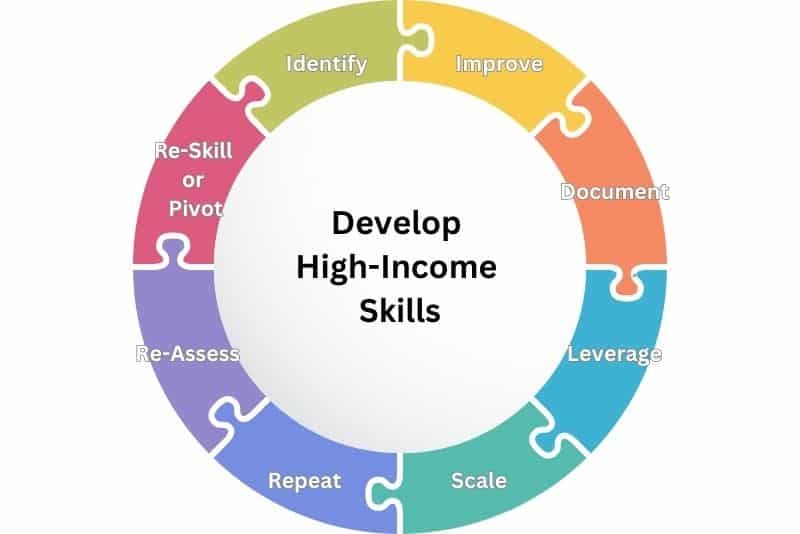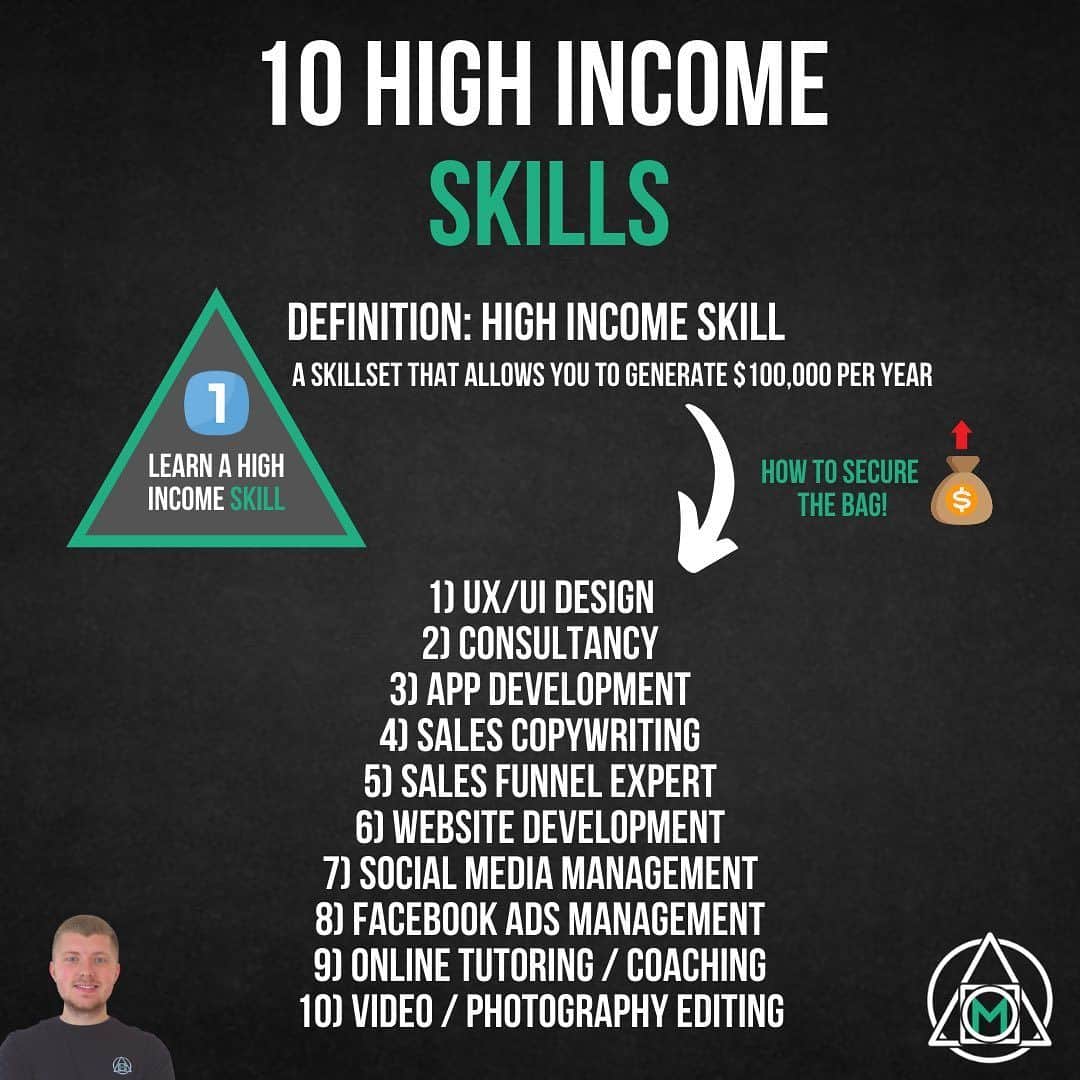What Makes a Skill Truly Valuable in Today’s Job Market
In today’s fast-paced and competitive job market, having the right skills can make all the difference in securing a high-paying job and advancing one’s career. But what exactly is a high-income skill, and how can individuals acquire them to boost their earning potential? A high-income skill is a specialized ability or expertise that is in high demand by employers and can command a premium salary. These skills are often characterized by their complexity, rarity, and value to organizations.
High-income skills can be found in various industries, including technology, finance, healthcare, and creative fields. Examples of high-income skills include data science, software engineering, digital marketing, and cloud computing. These skills are highly sought after by employers because they can drive business growth, improve efficiency, and increase revenue.
Individuals who possess high-income skills can enjoy better career prospects, higher salaries, and greater job security. According to the Bureau of Labor Statistics, workers with specialized skills and expertise tend to earn higher median salaries and experience lower unemployment rates compared to those without these skills. Moreover, high-income skills can provide individuals with a sense of personal fulfillment and satisfaction, as they are able to make a meaningful impact in their chosen field.
So, what makes a skill truly valuable in today’s job market? It’s not just about having a specific skill, but also about being able to apply it in a way that creates value for employers. This requires a combination of technical expertise, business acumen, and soft skills, such as communication, teamwork, and problem-solving. By acquiring high-income skills and developing a strong understanding of the job market, individuals can position themselves for success and unlock their earning potential.
In the next section, we’ll explore how to identify high-income skills that are in short supply and provide tips and strategies for acquiring them.
How to Identify High-Income Skills That Are in Short Supply
Identifying high-income skills that are in short supply is crucial for individuals looking to advance their careers and increase their earning potential. One way to do this is by researching industry trends and job market analytics. This can be done by analyzing job postings, salary data, and industry reports to identify the most in-demand skills.
Another way to identify high-income skills is by exploring emerging technologies such as AI, blockchain, and cybersecurity. These technologies are creating new job opportunities and career paths that require specialized skills. For example, the rise of AI has created a high demand for skills such as machine learning, natural language processing, and computer vision.
Online resources such as LinkedIn’s Job Market Insights and Glassdoor’s Job Trends can also provide valuable information on in-demand skills and job market trends. Additionally, attending industry conferences and networking events can provide opportunities to learn about new skills and technologies that are in high demand.
It’s also important to consider the skills that are transferable across industries. For example, skills such as data analysis, digital marketing, and project management are valuable in many different industries and can be leveraged to secure high-paying jobs.
When researching high-income skills, it’s also important to consider the level of competition and the potential for growth. Skills that are in high demand but have a low level of competition may be more valuable than skills that are in high demand but have a high level of competition.
By researching industry trends, job market analytics, and emerging technologies, individuals can identify high-income skills that are in short supply and position themselves for career advancement and financial success.
The Role of Emerging Technologies in Creating New High-Income Skills
Emerging technologies such as AI, blockchain, and cybersecurity are transforming the job market and creating new high-income skills and career paths. These technologies are driving innovation and growth in various industries, and companies are looking for professionals with the skills to develop, implement, and manage these technologies.
AI, for example, is creating new job opportunities in areas such as machine learning, natural language processing, and computer vision. Professionals with expertise in these areas can command high salaries and are in high demand by companies looking to leverage AI to drive business growth.
Blockchain technology is also creating new high-income skills and career paths, particularly in the areas of blockchain development, smart contract development, and cryptocurrency trading. As more companies adopt blockchain technology, the demand for professionals with expertise in these areas is expected to increase.
Cybersecurity is another area where emerging technologies are creating new high-income skills and career paths. With the increasing threat of cyber attacks, companies are looking for professionals with expertise in areas such as penetration testing, incident response, and security analytics.
These emerging technologies are not only creating new job opportunities but also changing the way we work. For example, the rise of remote work has created new opportunities for professionals to work from anywhere and has increased the demand for skills such as virtual communication, project management, and time management.
As these emerging technologies continue to evolve, it’s essential for professionals to stay up-to-date with the latest developments and to continuously update their skills to remain relevant in the job market. By doing so, they can position themselves for career advancement and financial success in the high-income skills market.
Developing High-Income Skills: A Path to Career Advancement
Developing high-income skills is a crucial step in advancing one’s career and increasing earning potential. With the rise of online learning platforms, it’s easier than ever to acquire the skills needed to succeed in high-income fields. Online courses, certifications, and training programs can provide individuals with the knowledge and expertise needed to excel in high-income careers.
Some examples of high-income skills that can be developed through online courses and certifications include data science, digital marketing, and cloud computing. These skills are in high demand by companies and can command high salaries. Additionally, online courses and certifications can provide individuals with the flexibility to learn at their own pace and on their own schedule.
Another way to develop high-income skills is through training programs. Many companies offer training programs for their employees to help them develop the skills needed to succeed in high-income careers. These programs can provide individuals with hands-on experience and the opportunity to work with experienced professionals in their field.
It’s also important to note that developing high-income skills is a continuous process. The job market is constantly evolving, and new skills are emerging all the time. To stay ahead of the curve, individuals need to be committed to continuous learning and professional development. This can involve staying up-to-date with industry trends, attending conferences and workshops, and seeking out new challenges and opportunities.
By developing high-income skills, individuals can position themselves for career advancement and financial success. Whether through online courses, certifications, training programs, or continuous learning, there are many ways to acquire the skills needed to succeed in high-income careers.
High-Income Skills in the Digital Age: The Rise of Remote Work
The rise of remote work has transformed the job market, creating new opportunities for professionals to work from anywhere and at any time. This shift has also led to a growing demand for high-income skills that are adaptable to remote work environments. Skills such as digital communication, project management, and time management are becoming increasingly valuable in the remote work era.
Remote work has also created new opportunities for freelancers and independent contractors to offer their services to clients around the world. High-income skills such as writing, design, and programming are in high demand, and freelancers with these skills can command high rates.
However, remote work also presents its own set of challenges. Professionals need to be self-motivated, disciplined, and able to work independently with minimal supervision. They also need to be able to communicate effectively with clients and team members remotely, which requires strong digital communication skills.
Despite these challenges, remote work offers many benefits, including greater flexibility, work-life balance, and the ability to work from anywhere. Professionals with high-income skills who are able to adapt to remote work environments can enjoy greater autonomy, flexibility, and earning potential.
Some examples of high-income skills that are in demand in the remote work era include cloud computing, cybersecurity, and data science. These skills are highly valued by companies and can command high salaries. Additionally, remote work platforms such as Upwork, Freelancer, and Fiverr provide opportunities for professionals to offer their services to clients around the world.
By developing high-income skills that are adaptable to remote work environments, professionals can position themselves for success in the digital age. Whether through freelancing, full-time employment, or entrepreneurship, the opportunities are endless for those with the right skills and mindset.
From Freelancing to Full-Time Employment: Leveraging High-Income Skills
High-income skills can be leveraged for both freelancing and full-time employment, offering professionals a range of career options. Freelancing provides the flexibility to work on a project-by-project basis, while full-time employment offers the stability and security of a regular salary.
Some examples of high-income skills that can be leveraged for freelancing include writing, design, and programming. Freelance writers, designers, and programmers can offer their services to clients around the world, working on a project-by-project basis. Freelancing platforms such as Upwork, Freelancer, and Fiverr provide opportunities for professionals to offer their services to clients.
On the other hand, high-income skills can also be leveraged for full-time employment. Many companies are looking for professionals with specialized skills such as data science, cybersecurity, and cloud computing. These skills are in high demand, and professionals with these skills can command high salaries and benefits.
When deciding between freelancing and full-time employment, professionals should consider their career goals, financial needs, and personal preferences. Freelancing offers the flexibility to work on a variety of projects and clients, while full-time employment provides the stability and security of a regular salary.
Regardless of whether professionals choose freelancing or full-time employment, developing high-income skills is essential for career advancement and financial success. By investing in their skills and education, professionals can position themselves for success in the job market and unlock their earning potential.
Some benefits of freelancing include the ability to work on a variety of projects, flexibility in scheduling, and the potential for higher earnings. However, freelancing also requires professionals to be self-motivated, disciplined, and able to manage their own time and finances.
On the other hand, full-time employment offers the stability and security of a regular salary, benefits, and a structured work environment. However, full-time employment may also require professionals to work long hours, commute to an office, and deal with office politics.
Staying Ahead of the Curve: The Importance of Adaptability in High-Income Skills
The job market is constantly evolving, and high-income skills are no exception. To remain relevant and competitive, professionals must be adaptable and willing to continuously update their skills. This is especially true in fields such as technology, where new tools and platforms are emerging all the time.
Some examples of high-income skills that require adaptability include data science, cybersecurity, and cloud computing. These skills are constantly evolving, and professionals must stay up-to-date with the latest developments to remain relevant.
Adaptability is also essential for professionals who want to transition into new fields or industries. For example, a professional with a background in marketing may need to learn new skills such as data analysis or digital marketing to transition into a role in a new industry.
The benefits of being adaptable are numerous. Professionals who are adaptable are more likely to be successful in their careers, as they are able to pivot and adjust to new challenges and opportunities. They are also more likely to be in demand, as employers value professionals who are able to adapt to changing circumstances.
So, how can professionals develop their adaptability? One way is to stay curious and keep learning. This can involve taking online courses, attending conferences and workshops, and reading industry publications. Professionals can also seek out new challenges and opportunities, such as taking on new projects or volunteering for new roles.
Another way to develop adaptability is to be open to feedback and criticism. Professionals who are open to feedback are more likely to be able to adjust and adapt to new circumstances, as they are able to learn from their mistakes and use them as opportunities for growth.
By developing their adaptability, professionals can stay ahead of the curve and remain competitive in the job market. This is especially true for high-income skills, where adaptability is essential for success.
Conclusion: Unlocking Your Earning Potential with High-Income Skills
In conclusion, high-income skills are a crucial component of career advancement and financial success in today’s job market. By understanding what makes a skill truly valuable, identifying high-income skills that are in short supply, and developing the skills required to succeed, professionals can unlock their earning potential and achieve their career goals.
Whether you’re looking to transition into a new field, advance in your current career, or simply increase your earning potential, developing high-income skills is essential. By investing in your skills and education, you can position yourself for success in the job market and achieve financial stability and security.
So, what are you waiting for? Start developing your high-income skills today and unlock your earning potential. With the right skills and knowledge, you can achieve your career goals and live the life you’ve always wanted.
Remember, the job market is constantly evolving, and high-income skills are no exception. Stay ahead of the curve by continuously updating your skills and knowledge, and always be on the lookout for new opportunities and challenges.
By following the tips and strategies outlined in this article, you can develop the high-income skills required to succeed in today’s job market. Don’t wait any longer to unlock your earning potential and achieve your career goals. Start developing your high-income skills today and take the first step towards a brighter financial future.








